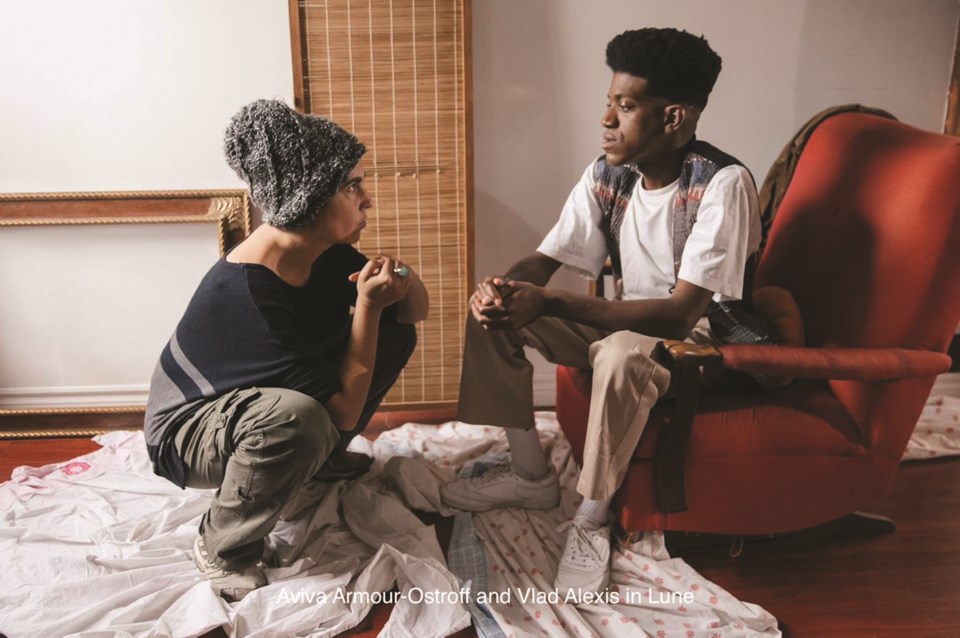Toronto actor, writer, producer and director Aviva Armour-Ostroff was thinking of a character to play in her next film. She knew she wanted to portray someone “smart and funny and powerful and scary and sexy and dangerous.” Suddenly, a light bulb went off.
“I realized I’m kind of describing my dad,” she recalls.
Armour-Ostroff co-wrote, co-directed and stars in Lune, which sees its Western Canadian premiere at this year’s Whistler Film Festival. She delivers a powerful performance as Miriam, a bipolar, Jewish-South African freelance journalist who leaves Toronto in 1994 to return to South Africa at the dawn of post-apartheid to vote for the recently-freed Nelson Mandela.
It’s a story that hits incredibly close to home, with the character of Miriam based on Armour-Ostroff’s late father, Brian, or Dr. Bro as he was affectionately known, and adapted from a play she wrote at 17.
“This story came about because I lived it,” she says.
What strikes you about Armour-Ostroff’s performance is its unflinching authenticity, something not seen too often in Hollywood’s depictions of mental illness.
“Knowing that my dad was a completely capable, highly intelligent person whose productivity was interrupted by this condition, it was important to reflect that people who have a condition aren’t cuckoo-bananas-cat-lady-from-The-Simpsons crazy. They’re just regular people that are often challenged to exist in this society,” she says. “I remember so often thinking, if my dad could just go live by himself in the middle of the woods, he’d be just fine. It’s actually society’s constructs that make it challenging for him to exist.”
Although Armour-Ostroff says the film functions as something of an homage to her late father—“My partner and I joke that the film ended up being Dr. Bro’s greatest hits”—it was important that audiences see Miriam’s, and by extension her father’s, flaws as well. In one scene we see Miriam hurl a racial epithet at her daughter’s African-Canadian boyfriend, a moment that ends up triggering a manic episode and the film’s climax.
“Throughout the film, Miriam is so clearly anti-apartheid and really wants to support this young Black man and help him make his music, and it’s genuine, and yet she’s still affected by her upbringing,” Armour-Ostroff says. “She grew up in a fairly affluent, privileged way. That’s in her, so I guess I wanted to expose the complexities of our own humanity and not paint it, for lack of a better term, in black and white, but in a grey zone that needs to be examined but is so hard to examine.”
Armour-Ostroff’s father saw the complexity of race firsthand while growing up in South Africa. In a poem he wrote that was adapted for the film, Brian says how he, a dark-skinned Jew, saw himself as white until the age of 13, until a burly Boer rail station master assumed he was coloured and struck him to the ground for boarding on the “white side” of the tracks.
“That was an awakening for him, just the unfairness of it. I do think it chemically altered him,” she remembers. “Whenever there would be an awareness or another political protest or another great arrest or violence, he would get emotionally triggered and that would often trigger his mania too. The fight against apartheid came from a genuine place of seeing it was unfair.”
At a fraught time in history when fights for racial and social equality have arisen across the globe, and more recently, in Canada after the discovery of unmarked graves at several former residential schools, what lessons can be applied from post-apartheid South Africa?
“For me and I would assume for my dad, too, this is no surprise. On some level it’s amazing that people are becoming more and more aware, but it’s also incredibly sad and frustrating that we’re like, ‘What, racism? In our own backyard?’ It’s not new information,” she says. “People have been saying that residential schools have existed and children are missing for years and years and years. People have been saying that cops are going to treat blacks differently than they are going to treat whites for years and years and years. So what I take from this on a personal level is more examination of my own bias and my own prejudice, and also there’s a lot of validation in my own beliefs and politics that I’ve had my entire life because I have been exposed to such deep racism in South Africa.”
Lune screens in-person as part of this year’s Whistler Film Festival at Village 8 Cinemas on Friday, Dec. 3 at 8:30 p.m., and Saturday, Dec. 4 at noon. Armour-Ostroff, actor Chloe Van Lanschoot, who plays Eliza, and Vlad Alexis, who plays Mike, will be in attendance.




